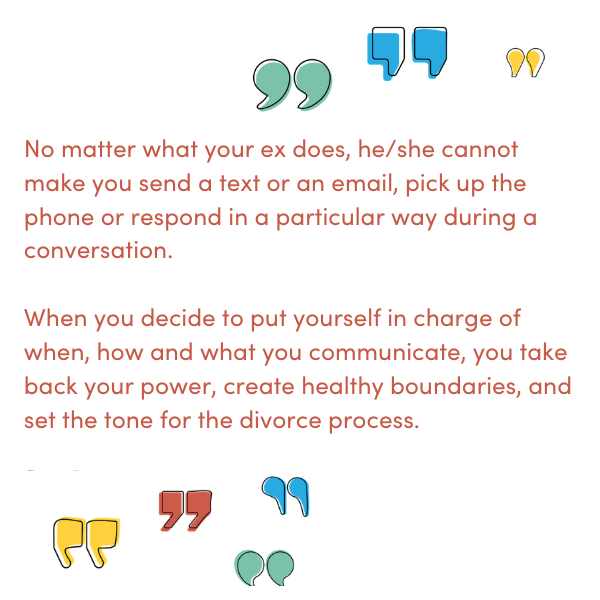Are Toxic Exchanges with Your Ex Raising Your Stress Level? This One Realization Will Change Everything

Maybe it’s a back and forth about an upcoming event with the kids, or finances, or one of you requested a schedule change. Sometimes, the topic doesn’t matter at all – if you’re in a negative cycle, any communication can devolve into blaming and disparaging, causing stress and anxiety for you and those around you.
If you’re engaged in this unhealthy back-and-forth and ready for it to end, the shift can happen as quickly as you desire. What do I mean?
Consider the following:
No matter what your ex does, he/she cannot make you send a text or an email, pick up the phone or respond in a particular way during a conversation.
When you decide to put yourself in charge of when, how and what you communicate, you take back your power, create healthy boundaries, and set the tone for the divorce process.
You may be saying, “But he said,” or, “She did…” and you’re probably right! Your ex may have started a fight, said something hurtful, or provoked you into a heated exchange. But none of the things they did change the fact that your response to any situation is a powerful tool that’s completely in your control. That knowledge is an important first step in changing the dynamic, but it’s still very difficult to break a pattern of ugly communication. Many people feel their ex doesn’t deserve their kindness or grace, and that may be true. But what if you stop doing it for your ex, and choose not to engage in that kind of communication because it feels better for you? This focus on doing things that improve your well-being, rather than on whatever your ex is doing, is a critical shift that will help you move through divorce and begin to heal.
Here are some questions to ask yourself as you make decisions:
What if…
- You ask yourself who you are at your best, and decide to show up as that person in every interaction?
- You ask yourself if every decision you are making is based in love?
- You create a list of responses to use in challenging situations, such as, “I disagree with that characterization,” or “That’s not my recollection.”
- You simply do not respond to a toxic text?
- You let a call go to voicemail so you can breathe and compose and appropriate response?
- You write down the angry words you want to say in a journal, but don’t say or share them?
- You wait to respond to an interaction until you’re sure you can respond with intention and civility?
- You use lawyer, therapist, mediator and author, Bill Eddy’s Brief, Informative, Factual, Firm approach to communication (learn more here)?
